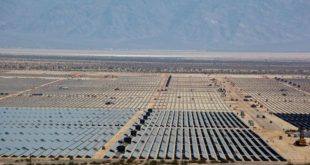Biomass Plant Supports New Hampshire’s RPS Goal of 25 x 25
BERLIN, N.H., June 9, 2010 — Public Service of New Hampshire has reached agreement with Laidlaw Berlin BioPower LLC, an affiliate of Laidlaw Energy Group, Inc., to purchase the energy from a proposed wood-fired power generation facility planned for New Hampshire’s North Country. When operational, the 70 megawatt gross capacity biomass facility in Berlin will be the largest wood-burning power plant in the state, and will move New Hampshire closer to its goal of 25 percent renewable energy by the year 2025.
“We are committed to growing our portfolio of renewable energy, and the Laidlaw biomass plant will take us a significant step forward toward meeting the state’s Renewable Portfolio Standards mandate,” noted Gary Long, PSNH’s President and Chief Operating Officer. “Besides the energy, this plant will generate jobs — both direct and indirect — and we expect it to provide a real boost to the North Country’s economy.”
When operational, the plant will consume local, clean, wood chips which are byproducts of the local forest products industry and land management practices. “One of our key development strategies is to have Coös County become the renewable energy capital of Northern New England,” said Max Makaitis, Economic Development Director, Androscoggin Valley Economic Recovery Corporation (AVER). “We are particularly excited about biomass projects like Laidlaw’s, because they help create jobs, not only at the plant itself, but also in the forest, and in those services that support our foresters.”
“We are proud to partner with PSNH, AVER and the Berlin community to make the North Country a leader in clean, renewable energy,” said Michael Bartoszek, Laidlaw Berlin BioPower President and CEO. “This agreement is an affirmation of the hard work of many to ensure that we have a solid plan with which to move forward. We at Laidlaw are very pleased to play a role in helping to support the future economic success of Berlin and Coos County, and in particular the creation of jobs at a time when they are truly needed.”
As a generation source that utilizes biomass, the Laidlaw plant will produce not only “energy,” but also “renewable energy certificates” (RECs), which all providers of electricity in New Hampshire must obtain in order to comply with the state’s renewable energy law. PSNH’s agreement with Laidlaw calls for the utility to purchase the energy, the generating capacity, and the RECs produced by the biomass plant. PSNH expects that the amount of RECs purchased annually from Laidlaw will fulfill much of PSNH’s “Class I” REC requirementsthrough 2015 and a majority of the company’s requirements over the next decade. The agreement between PSNH and Laidlaw runs for 20 years.
The long-term power purchase agreement must be considered and approved by the N.H. Public Utilities Commission in order to ensure that it is in the public interest. At this time, the Laidlaw project has an application pending before the NH Site Evaluation Committee (SEC), which is charged with regulating the development of significant new energy facilities.
With the addition of wood-fired energy produced by the 70 megawatt gross capacity Laidlaw biomass plant, PSNH will have arguably the highest percent of renewable energy of any electric utility in New England, with approximately 26 percent of the energy it supplies to its customers being renewable energy generated by PSNH itself or by independent New Hampshire resources selling energy to PSNH.
According to state rules, however, not all of PSNH’s renewable energy sources are certified to produce RECs. Most of the energy produced by PSNH’s hydroelectric facilities, for example, does not qualify under the NH Renewable Portfolio Standard (RPS).
“The development of new renewable energy sources that meet the State RPS requirements will take time and comes with a cost,” noted Gary Long. “But, we have confidence that we will get there by growing our own portfolio and by continuing to partner with quality, economic projects that best serve our customers’ interests.”
PSNH’s Renewable Energy Profile
PSNH owns and operates Northern Wood Power, currently the state’s largest biomass power generation facility, located in Portsmouth. The company also hosts one of the largest solar facilities in New Hampshire, a 51 kilowatt array in Manchester. In 2006, PSNH partnered with Iberdrola Renewables on the construction of a 24 megawatt wind farm in Lempster, and purchases 90 percent of the project’s energy and RECs. The company is now anticipating the development of Laidlaw’s biomass facility in Berlin, and its production of more than 400,000 megawatt hours of energy annually. Together with the purchase of energy from smaller existing facilities — mainly biomass and hydro — about 26 percent of the energy consumed by PSNH energy customers will be generated by renewable energy sources once the Laidlaw facility begins commercial operation.
 Alternative Energy HQ solar power for homes, wind energy, and bio fuel issues
Alternative Energy HQ solar power for homes, wind energy, and bio fuel issues






